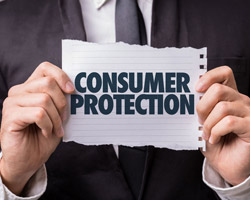Consumer Rights Law
 For consumers in today’s marketplace, there’s good news. The old standard of caveat emptor—let the buyer beware—has been replaced in most instances by specific statutes providing protection to ordinary citizens. The Food and Drug Administration has detailed regulations to protect your health. Lemon laws protect you when you purchase a vehicle, and consumer credit regulations keep unscrupulous lenders at bay. There are even regulations that limit the practices of debt collectors. Of course, the more you know about the laws and regulations, the better you will be able to protect yourself, and the more effectively you’ll be able to work with counsel to put a stop to illegal or fraudulent practices.
For consumers in today’s marketplace, there’s good news. The old standard of caveat emptor—let the buyer beware—has been replaced in most instances by specific statutes providing protection to ordinary citizens. The Food and Drug Administration has detailed regulations to protect your health. Lemon laws protect you when you purchase a vehicle, and consumer credit regulations keep unscrupulous lenders at bay. There are even regulations that limit the practices of debt collectors. Of course, the more you know about the laws and regulations, the better you will be able to protect yourself, and the more effectively you’ll be able to work with counsel to put a stop to illegal or fraudulent practices.
GetLegal.com’s Consumer Rights Law Center offers a wealth of information to help buyers of goods and services protect their rights. In addition to summaries of key consumer protection statutes, we also provide information to help you get in touch with authorities in your state.
Connect with Top-rated Attorneys Near You
Consumer Rights Law Practice Areas
Other Other Practice Areas Topics
Laws Protecting Civil Liberties, Civil Rights, and Human Rights
Agricultural Law
Constitutional Law
International Law and Foreign Relations
Aviation Law
Education Law
Entertainment and Sports Law
Gaming Law
Government Agencies And Programs
Communications and Media Law
The Laws Governing Military Service Personnel in the United States
Latest Article
What Is a Trust Fund? A Comprehensive Guide
A trust fund is a powerful tool that has stood the test of time. It is an essential instrument in modern wealth manageme... Read More
Arraignment: Meaning, Common Charges, & Process
Arraignment is a pivotal moment within the criminal justice system, marking the formal initiation of criminal proceeding... Read More
What Is Probable Cause? Definition and Examples
The Constitution protects you from being searched without a valid reason. But what exactly constitutes a valid reason? A... Read More
GETLEGAL®ATTORNEY DIRECTORY
Find Leading Attorneys in Your Area
NEED PROFESSIONAL HELP?
Talk to an Attorney
How It Works
- Briefly tell us about your case
- Provide your contact information
- Choose attorneys to contact you






